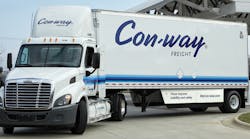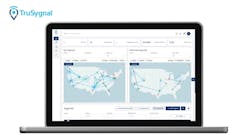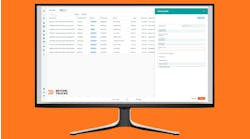In a move with big ramifications for the North American freight market, XPO Logistics said this week it plans to purchase trucking and logistics conglomerate Con-way Inc. lock, stock, and barrel for roughly $3 billion, rebranding all of Con-way’s operating companies – LTL carrier Con-way Freight, Menlo Logistics, Con-way Truckload and Con-way Multimodal – under the XPO moniker.
Under the terms of the agreement, XPO said it will launch a tender stock offer for all of Con-way's outstanding shares at a cash price of $47.60 per share. Following the tender offer, if successful, Con-way will become a wholly owned subsidiary of XPO.
Bradley Jacobs, XPO’s chairman and chief executive of XPO Logistics, will lead the combined company with Douglas Stotlar, Con-way's president and CEO, serving in a “limited role” as an independent advisor to the combined company through the first quarter of 2016.
"Our opportunistic acquisition of Con-way will make XPO the second largest provider of LTL transportation in North America, [which is] a $35 billion market,” Jacobs said in a statement. “LTL is a non-commoditized, high-value-add business that's used by nearly all of our customers. Con-way is a premier platform that we will run with a fresh set of eyes as part of our broader offering.”
More importantly, he added, XPO gains strategic ownership of assets that will benefit both itself and customers during periods of “tight capacity.”
Jacobs also noted that the Con-way acquisition will nearly double XPO’s pro-forma full year earnings to approximately $1.1 billion and increase our revenue to $15 billion upon its closing. “We'll immediately begin executing our plan to improve the operating profit of the acquired operations by $170 million to $210 million over the next two years,” he said.
Con-way’s Stotlar pointed out in a statement that the “combination” of XPO and Con-way “will mean more services for our customers, more miles for our drivers, and more career opportunities for our employees as part of XPO's global organization.”
XPO’s Jacobs highlighted several other key aspects of this deal for both companies from an operational and costs saving perspective:
- The combination will strengthen XPO's position in the highly desirable e-commerce sector, which is projected to grow at a pace of 18% to 21% annually. XPO and Con-way both have e-fulfillment contract logistics platforms in North America and Europe.
- Between the recent acquisition of Norbert Dentressangle, and the planned acquisition of Con-way, XPO will have significantly more ground transportation capacity to serve customers in Europe and North America. XPO's network of brokered, owned and contracted capacity will have lane density covering approximately 99% of all postal codes in the United States, as well as the regions that produce 90% of the Eurozone's GDP.
- The addition of Con-way's truckload fleet, including dedicated carriage, will increase cross-border Mexico services, which include intermodal, truck brokerage and expedite. Cross-border growth is projected to outperform industry growth, due to the near-shoring of manufacturing.
- The combination will grow XPO's global ground transportation network to approximately 19,000 owned tractors and 46,000 owned trailers, 10,000 trucks contracted through independent owner operators, and access to more than 50,000 independent carriers. In North America, XPO will have approximately 11,000 owned tractors and 33,000 owned trailers, 6,000 trucks contracted through independent owner operators, and access to more than 38,000 independent carriers.
- Within a year, XPO expects to leverage its combined technology infrastructure to reduce Con-way's annual technology spend of $227 million, which is largely outsourced;
- Expand XPO’s freight brokerage platform with the integration of Con-way's $200 million brokerage business, to share capacity and data through XPO's proprietary Freight Optimizer technology.
- By year two of the acquisition, XPO expects to reduce its $3.6 billion combined spend on purchased transportation;
- Using the larger flow of data from its combined $2.7 billion of freight under management to identify carriers, assign loads and fill backhauls more efficiently.



